Susanne Kennedy (Germany)
Susanne Kennedy turns actors into avatars and makes human life seem alien. On her candy-coloured stages, masked figures glitch and glide like animatronics. Instead of speaking, they lip-sync along to recorded, distorted dialogue.
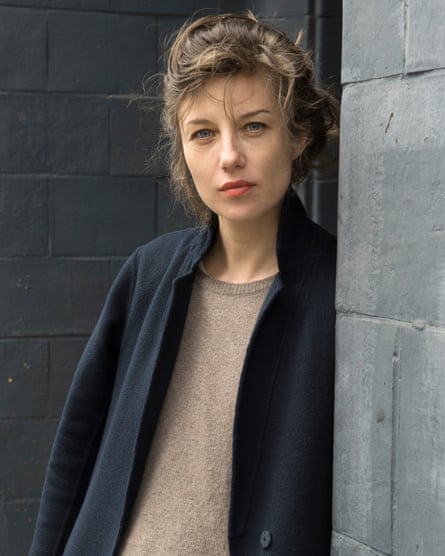
Yet her shows mostly sit in banal, suburban settings. She turned the small-town Bavarians of Marieluise Fleißer’s 1924 play Purgatory in Ingolstadt into pallid zombies, and made a mannequin of Fassbinder and Fengler’s Herr R, the petit-bourgeois conformist who ultimately cracks. For Jeffrey Eugenides’ The Virgin Suicides, her teenage girls were flowered idols on a stage caught between shrine and shopping mall. Kennedy’s dislocated style exposes the emptiness of neoliberal life. Her shows loop round in circles as if stuck on repeat.
Born in Friedrichshafen, Kennedy began her career in Dutch theatre, directing Sarah Kane and, tellingly, Enda Walsh, but was hailed as a significant voice on returning to Germany in 2009. She had two shows selected for consecutive Theatertreffen festivals and joined Chris Dercon’s directorial team at the Volksbühne – the first theatremaker in his cross-disciplinary programme.
The move made sense. Her theatre borders on installation. “I see a theatre where the voice no longer belongs to the body, the face is no longer the conveyor of emotion,” she has written. “In the end, the actor becomes imperceptible.”
Julien Gosselin (France)
Julien Gosselin goes long. His four-hour adaptation of Michel Houellebecq’s novel The Elementary Particles was dwarfed by a 12-hour stage version of Roberto Bolaño’s unfinished epic 2666. No bother: Gosselin’s swaggering style staves off longueurs, marrying pop sensibility with a keen self-awareness.
His latest marathon, which premiered in Avignon last month, mashed up three Don DeLillo novels – Players, Mao II and The Names – to track the evolution of terrorism over 10 hours. It was exhilarating: the offspring of Ivo van Hove’s exhaustive stage adaptations and Katie Mitchell’s live films. Starting on a closed set, the action only visible on a big screen, it allowed terror groups to tear apart a toy world. The stage opened up, the cinematography grew glossier, terror became part of the picture.
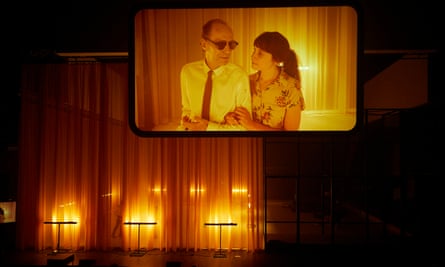
On graduating from Lille’s Théâtre du Nord school, Gosselin set up a collective, If only you could lick my heart. Its debut was documentary theatre: Fausto Paravidino’s interrogation of a protestor’s death at the 2001 G8 summit, Genoa ’01. But the company immediately swerved into surrealism with Anja Hilling’s play about six friends caught in a forest fire, Black Animal Sadness. Gosselin swamped the whole stage with smoke.
At 26, he became the youngest director invited to the Avignon festival and, if critics cocked a snook at his Houellebecq, audiences took Gosselin’s verve to heart straight away. Next year, there’s more DeLillo: Falling Man, the story of a 9/11 survivor, opens in Amsterdam in March.
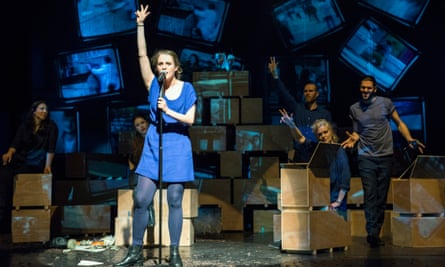
Yael Ronen (Austria)
Eight Romany actors stand on stage in Rome, all in white, and proclaim themselves a pan-European army. One’s a drag artist from Sweden, another’s Serbian and identifies as queer. A third is blonde with a home counties accent. It’s December 2017 and, in just six months time, Italy’s new interior minister, Matteo Salvini, will announce a compulsory census of Roma people.
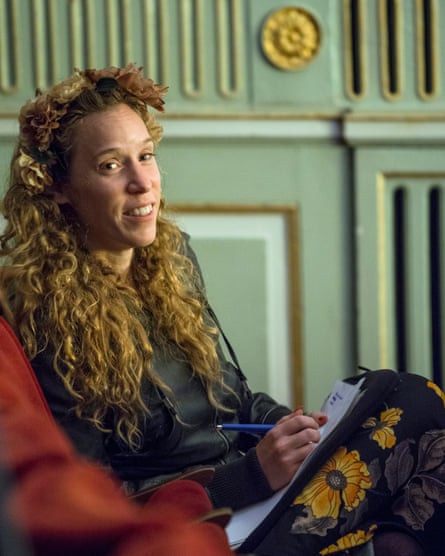
This is the territory Yael Ronen works in: hotly political and intensely personal. Her devised shows draw on her actors’ lives and identities, mingling fact with fiction in a way that teases comedy out of significant conflicts – Yugoslavia’s civil war in Common Ground, Israel-Palestine in The Situation.Her work places great stock in the stage as a space for unity, bringing people together across political divides. Her companies, whether her Roma Army or the Gorki Theatre’s new Exil Ensemble made up of immigrants from Afghanistan, Syria and Palestine, stand as symbols of collaboration. Like the work of Lola Arias and Rimini Protokoll, Ronen’s shows practise what they preach.
Caroline Guiela Nguyen (France)
Saigon set Caroline Giuela Nguyen apart. Since its premiere last year, it has zipped around Europe non-stop, festival to festival. At home, it won its writer-director a second Molière award nomination.
Staged in a replica Vietnamese restaurant, the four-hour piece swung between Saigon in 1956, as French colonialists shipped out post Dien Bien Phu, and Paris 40 years later, as Vietnamese exiles faced the prospect of returning for the first time. Nguyen made that trip at 16, with her mother, but Saigon was not straightforwardly autobiographical. It grew out of two years of research with her cast, and the show swam with ghosts, grief and dreamy nostalgia as it kept various storylines spinning like plates.
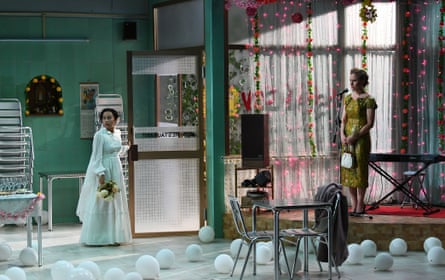
That’s a mark of her beginnings – not only as a sociology student, but in reshaping literary classics for the stage. Having first worked with novels, including a two-parter that chucked Madame Bovary into today’s world, her company, Les Hommes Approximatifs, changed tack, focusing on overlooked stories and underrepresented lives. She began collaborating in prisons with Joël Pommerat and, in her shows, started to focus on the scars left by colonialism. Her shows have a gorgeous, unreal aesthetic, but the language is radical too: by refusing surtitles for multilingual shows, Nguyen pushes against old hierarchies and privileges.
Oliver Frljić (Croatia)
On a wall in Vinkovci, eastern Croatia, the words “Death to Oliver Frljić” appeared overnight. He has drawn protests and faced violent threats, lost festivals their funding and seen politicians vow to remove him from post. Frljić is one of the continent’s most controversial theatre directors – and one of its most necessary.
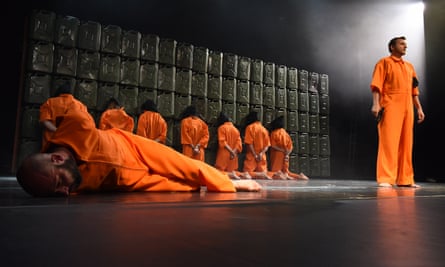
A strident and unapologetically political artist, Frljić’s work scrutinizes and satirises the political fallout across the former Yugoslavia: the fruits of war, the rise of far-right nationalism, the meekness of democracy. He counters with shock and scorn. One show has actors urinating on a map of the region. Another sees a woman extract the national flag from her vagina. He might push unruliness to extremes – gratuitously so, perhaps – but this is no time for politeness. Frljić is a frontline artist.
For all its messy anarchism – he once had teenagers instruct audiences in bomb-making – Frljić’s theatre is calculated, too. He challenges the form and questions its limits, writing fake personal histories for his actors, quoting and critiquing other shows in his own and flicking between representation and reality. His theatre, as one critic put it, is “nothing more and nothing less than the search for the right artistic tool to stop the descent into national hell”.
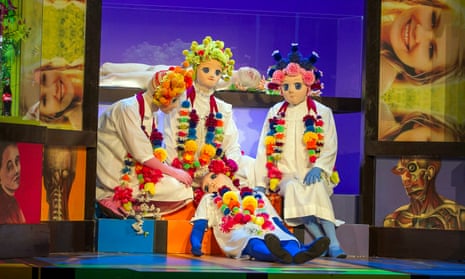
Comments (…)
Sign in or create your Guardian account to join the discussion